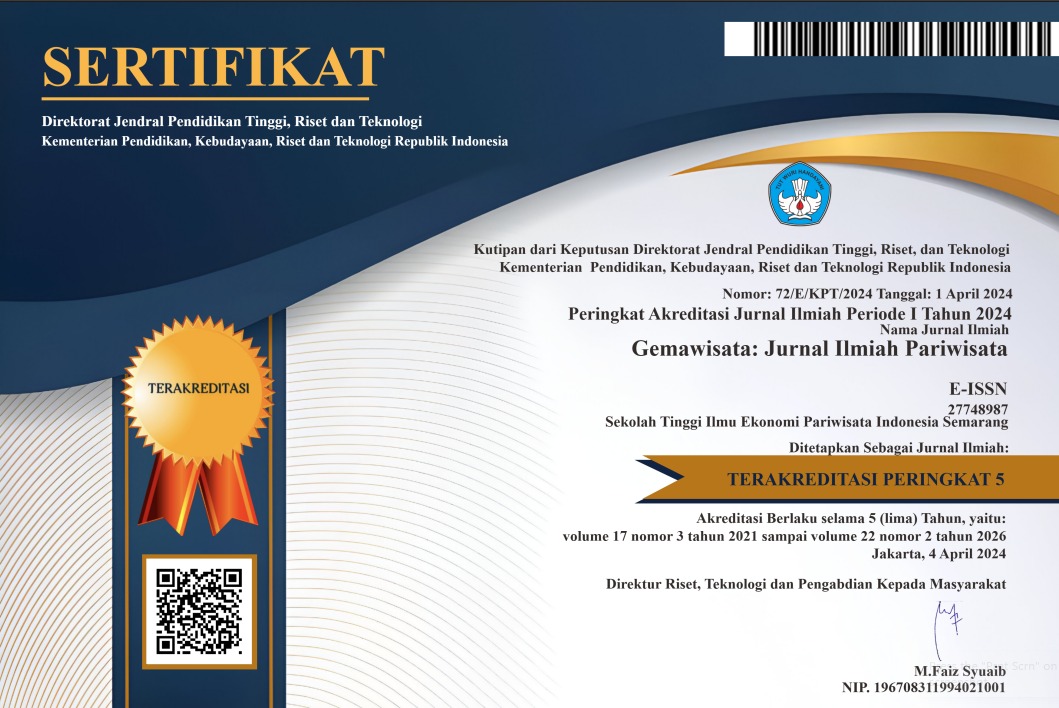Pengalaman Tamu sebagai Tolok Ukur Kualitas Layanan
Studi Kualitatif pada Hotel Bintang Empat di Bali
DOI:
https://doi.org/10.56910/gemawisata.v21i3.850Keywords:
Guest experience, service quality, four-star hotels, Bali, phenomenologyAbstract
This study aims to explore guest experience as a benchmark for service quality in four-star hotels in Bali. Using a qualitative phenomenological approach, the research was conducted at two representative hotels, namely Four Points by Sheraton Bali, Kuta and The Anvaya Beach Resort Bali. Data were collected through semi-structured in-depth interviews with 20 guests who had stayed for at least one night within the past six months, online review analysis from platforms such as Booking.com and TripAdvisor, as well as participatory observations in service areas.The findings reveal that the dimensions of service quality most influencing guest experience include staff responsiveness, facility comfort, and the authenticity of services that integrate local culture. Guests appreciated staff friendliness and professionalism, room cleanliness, and personal touches such as being greeted by name or receiving special attention, which created positive emotional experiences. However, several weaknesses were also identified, such as delays in room service during peak hours and inconsistent maintenance of facilities. These results are consistent with the SERVQUAL model (Parasuraman et al., 1988), which emphasizes five key dimensions, but this study highlights the emotional experience dimension, which has been less explored in hospitality research in Bali. This study makes a theoretical contribution by broadening the understanding of the relationship between service quality and guest experience, particularly in the context of four-star hotels that are characterized by high service standards and intense competition. The practical implications suggest that hotel management should strengthen service personalization, ensure consistency in staff reliability and responsiveness, and enhance the integration of local cultural values as a differentiation strategy to increase competitiveness. Thus, guest experience can serve as a primary indicator that not only reflects service quality but also builds customer loyalty and strengthens the hotel’s positive image among both domestic and international tourists.
References
Braun, V., & Clarke, V. (2006). Using thematic analysis in psychology. Qualitative Research in Psychology, 3(2), 77–101. https://doi.org/10.1191/1478088706qp063oa
Chen, C. F., & Chen, F. S. (2010). Experience quality, perceived value, satisfaction and behavioral intentions for heritage tourists. Tourism Management, 31(1), 29–35. https://doi.org/10.1016/j.tourman.2009.02.008
Creswell, J. W. (2013). Qualitative inquiry and research design: Choosing among five approaches (3rd ed.). SAGE Publications.
Dewi, N. L. P. D. T., & Putri, D. G. (2023). Preferensi tamu terhadap pelayanan room attendant di Four Points by Sheraton Bali Ungasan. Journal of Hospitality Accommodation Management (JHAM), 2(2), 77–86. https://doi.org/10.52352/jham.v2i2.1120
Gunawan, G. A., Susanto, B., Meirejeki, I. N., & Sumawidari, I. A. K. (2022). Analysis of guest satisfaction through the service quality of the Aloha Department at Aloft Bali Seminyak. Journal of Applied Sciences in Travel and Hospitality, 5(1), 30–40. https://doi.org/10.31940/jasth.v5i1.30-40
Husserl, E. (1970). The crisis of European sciences and transcendental phenomenology. Northwestern University Press.
Lincoln, Y. S., & Guba, E. G. (1985). Naturalistic inquiry. SAGE Publications.
Parasuraman, A., Zeithaml, V. A., & Berry, L. L. (1988). SERVQUAL: A multiple-item scale for measuring consumer perceptions of service quality. Journal of Retailing, 64(1), 12–40.
Pine, B. J., & Gilmore, J. H. (1999). The experience economy: Work is theatre & every business a stage. Harvard Business School Press.
Putra, I. G. N. P., & Astawa, I. P. (2020). Pengaruh kualitas pelayanan terhadap kepuasan pelanggan pada hotel berbintang di Bali. Jurnal Kepariwisataan dan Hospitalitas, 4(2), 45–56.
Suardana, I. W., & Widiastuti, M. (2021). Analisis kualitas layanan perhotelan berbasis budaya lokal Bali. Jurnal Ilmiah Hospitality Management, 10(1), 13–27.
Sudarmawan, I. M. A., & Suryani, N. K. (2021). Analysis of guest satisfaction through the service quality of the Aloha Department at Aloft Bali Seminyak. Journal of Applied Sciences in Travel and Hospitality, 4(2), 56–67.
Suhartanto, D., Brien, A., Primiana, I., Wibisono, N., & Triyuni, N. N. (2019). Tourist loyalty in creative tourism: The role of experience quality, value, satisfaction, and motivation. International Journal of Hospitality & Tourism Administration, 21(7), 1–17. https://doi.org/10.1080/15256480.2019.1638202
Suprapti, N. W. S., Yasa, N. N. K., & Astawa, I. P. (2020). Quality analysis of service in educating the effect of prices, products, relational marketing and management commitment on customer satisfaction of four star hotels in Badung Regency, Bali. International Journal of Management and Commerce Innovations, 8(2), 1033–1043.
van Manen, M. (1990). Researching lived experience: Human science for an action sensitive pedagogy. State University of New York Press.
Vargo, S. L., & Lusch, R. F. (2004). Evolving to a new dominant logic for marketing. Journal of Marketing, 68(1), 1–17. https://doi.org/10.1509/jmkg.68.1.1.24036
Widiantara, I. M. G., & Putri, K. A. D. (2022). Service quality and customer satisfaction in four-star hotels in Bali. Journal of Tourism and Hospitality Studies, 11(3), 55–70.
Wijaya, I. K. A., & Dewi, N. M. K. (2023). Guest experience as a determinant of service quality in Bali hotels: A qualitative study. International Journal of Hospitality and Tourism Management, 8(1), 22–34.


1_(1).jpg)






